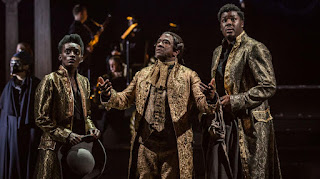 |
| Lucian Msamati and Southbank Sinfonia - Peter Schaffer's Amadeus - National Theatre - photo Marc Brenner |
Reviewed by Robert Hugill on Nov 30 2016
Star rating:
A revival which places Mozart's music at the core of the production with impressive use of live performance
 |
| Angus Macbean and Southbank Sinfonia - photo Marc Brenner |
The production did not just use live music, but the musicians of the Southbank Sinfonia were an integral part of the production. Opening on a bare stage, the musicians assembled and in front of them Lucian Msamati's elderly Salieri in a wheel-chair addressed the audience, but interacted with the musicians too. For much of the play they were on stage, contributing and interacting, sometimes playing Mozart's music and sometimes other work (the extra music was by musical director Simon Slater), and sometimes just making noises.
 |
| Aiden Gillen & ensemble - photo Marc Brenner |
The singers were all characters in the play, so that Fleur de Bray was Salieri's mistress Katharine Cavallieri, for whom Konstanze in Die Entfuhrung aus dem Serail was written (so we heard her in an extract of the opera). Wendy Dawn Thompson was Salieri's (largely silent) wife, and the remaining singers (Matthew Hargreaves, Peter Willcock, Eamonn Mulhall and Robyn Allegra Parton) all played smaller roles, but they came to the fore in the extracts from Mozart's operas having to turn their hand to Fiordiligi, Dorabella, Figaro, the Commendatore, the Queen of the Night and many more. Perhaps the oddest operatic sequence was the nightmare version of The Magic Flute which re-wrote everything and was, presumably, meant to be disturbing.
Whenever Salieri referred to a piece of Mozart's music, we usually heard some of it, including the magical moment when he hears the wind serenade in E flat, the first piece of Mozart's Salieri has heard. When Salieri leafs through a sheaf of Mozart's manuscripts we hear snatches from the different pieces, as he reads them. The performance of the Requiem, which involved virtually the entire cast, was both the culmination of the drama and the logical conclusion of the use of live performance.
 |
| Karla Crome, Aiden Gillen - photo Marc Brenner |
This was quite a long evening, three hours and 15 minutes including a 20 minute interval. And frankly, despite some superb individual performances and a spectacular production, the evening began to pall and you realised that though the play might be iconic, it has its limitations. This was particularly true of the closing scenes, and it would have benefited from significant tightening.
 |
| Sarah Amankwah, Hammed Animashaun, Lucian Msamati photo Marc Brenner |
The remainder of the cast were strongly supportive, with Karla Crome as a nicely tart Constanze, and Geoffrey Beevers as the po-faced Swieten. Sarah Amankwah and Hammed Animashaun were the two narrator characters, Venticelli, who gently led us through the vicissitudes of the plot.
Watching the piece, we always have to bear in mind that this isn't history it is simply a play. And frankly one which does neither Mozart nor Salieri justice. Mozart was nowhere near the gurning buffoon that was depicted, and Salieri was a rather finer composer than the play implied. Having lived in Vienna since he was 16, he also, as far as I can understand, regarded himself as a German composer that than an Italian one. The use of live music, however, added a disturbing level of validity to Schaffer's re-write of history, as if by hearing Mozart's music live we were reinforcing Schaffer's view of his personality.
 |
| Lucian Msamati, Southbank Sinfonia & ensemble - Peter Schaffer's Amadeus - National Theatre - photo Marc Brenner |
Director: Michael Longhurst
Lighting: Jon Clark
Sound: Paul Arditti
Design: Chloe Lamford
Choreography: Imogen Knight
Music director & additional music: Simon Slater
Sound design: Paul Arditti
Cast list:
Venticello - Sarah Amankwah
Venticello - Hammed Animashaun
Baron Gottfried van Swieten - Geoffrey Beevers
Katharina Cavallieri - Fleur de Bray (soprano)
Constanze Weber - Karla Crome
Emperor Joseph II - Tom Edden
Wolfgang Amadeus Mozart - Adam Gillen
Citizen of Vienna - Matthew Hargreaves (bass-baritone)
Citizen of Vienna - Michael Lyle
Citizen of Vienna/Kapellmeister Bonno - Andrew Macbean
Citizen of Vienna - Nicholas Gerard-Martin -
Count Johann Kilian von Strack - Alexandra Mathie
Antonio Salieri - Lucian Msamati
Salieri's Valet - Eamonn Mulhall (tenor)
Citizen of Vienna - Robyn Allegra Parton (soprano)
Count Franz Orsini-Rosenberg - Hugh Sachs
Citizen of Vienna - Eleanor Sutton
Teresa Salieri - Wendy Dawn Thompson (mezzo-soprano
Citizen of Vienna / Major-Domo - Everal A Walsh
Salieri's Cook - Peter Willcock (bass baritone)
Southbank Sinfonia
Ruth Elder, Zanete Uskane, Douglas Harrison, Minsi Yang (violins)
Jennifer MacCallm, Dan Shilladay (violas)
Patrick Tapio Johnson, Angelique Lihou (cellos)
Giuseppe Ciraso Cali (bass)
Simon Gilliver (flute)
Anne Turmeau, Helen Clinton (oboes)
Oliver Pashley, Kimon Parry (clarinets)
Andrew Watson, Eanna Monaghan (bassoon)
Brendan Parravisini, Laetitia Stott (horn)
Sarah Campbell (trumpet)
Beth Higham-Edwards (timpani)
Matthew Scott (fortepiano)



%20and%20kids.jpg)
.webp)




.jpg)

No comments:
Post a Comment